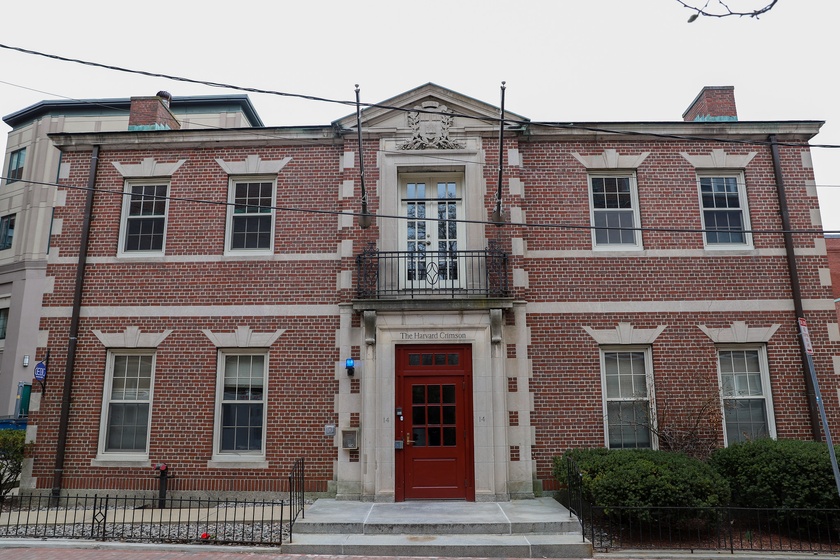{shortcode-b5fa142dbbb0bbcd1c557461b04d769e6e36c4ff}
{shortcode-429a20a43b31c14ee603587b9f7215faac9b0e1d}or decades, Michael J. Abramowitz ’85 has been a staunch defender of journalism, taking him from The Crimson’s own newsroom to federal court.
“I can just see him kind of bounding into the newsroom, just always kind of high energy and funny and joking around,” his friend and former Crimson editorial chair Holly A. Idelson ’85 says.
Years later, Abramowitz’s commitment to journalism hasn’t wavered. In late March, he sued the Trump administration, asking a federal court to declare the White House’s dismantling of the government-funded media outlet Voice of America, of which he served as director, as unlawful.
First broadcasted over the radio in 1942, VOA was founded to counter Nazi propaganda by providing impartial news to a global audience. Eighty years later, the network strives to provide independent journalism to countries that lack a robust free press.
Abramowitz, along with nearly all of VOA’s 1,300 journalists, producers, and support staff, was “placed on administrative leave” by the Trump administration on Mar. 15. Trump wrote in an executive order that VOA would be “eliminated to the maximum extent consistent with applicable law.”
The executive order falls in line with the administration’s push towards government reduction, as the Elon Musk-headed Department of Government Efficiency has aggressively moved to slash “unnecessary” federally funded programs.
“I am working hard to make the case in the courts, in the media, to Congress, and to our other stakeholders that Voice of America has a vital mission, and that to dismantle it would be the height of folly,” Abramowitz wrote in a letter to his colleagues that he later shared on LinkedIn.
“I am privileged to be your leader and have the highest respect for your dedication to fact-based, objective journalism,” he added.
A federal judge temporarily blocked the dismantling of VOA on April 22, ordering that the White House restore the organization’s employees until the case is decided in court.
Before all this, though, Abramowitz was a de facto resident of 14 Plympton St., serving as the president of The Crimson from 1984-85. A Government concentrator, Abramowitz interwove his political focus with a “really strong interest in journalism,” as Idelson describes.
“He wasn’t just someone that liked to write in a literary way, I think he really believed in the mission of newspapers,” she says.
As a Faculty of Arts and Sciences reporter, Abramowitz was most remembered by colleagues for his work covering protest movements against the University’s investments in South African companies participating in Apartheid.
The headlines he authored, such as “Making Bombs With Harvard’s Bucks,” “The Ethics of Investment,” and “Talking Nukes,” reflected the tension between the University’s financial interests and its social responsibility — an issue that remains central to protest movements on campus today.
After graduating from the College, Abramowitz spent 24 years as a reporter and editor at The Washington Post, eventually rising to the position of White House correspondent. During his time there, he led a team that won the Pulitzer Prize for national reporting on the post-9/11 capture of Osama bin Laden.
“I think there was always a civic-minded part of it for him,” Idelson says, speaking to Abramowitz’s political coverage.
For Abramowitz, however, journalism was only the first of many channels in his democratic efforts. He transitioned to nonprofit work following his tenure at the Post, serving as the director of the U.S. Holocaust Memorial Museum’s Levine Institute for Holocaust Education, where he led its genocide-prevention projects.
“I did not anticipate and was surprised at the time, but it had a lot of sense in retrospect,” writes Jacob M. Schlesinger ’84, Abramowitz’s colleague at The Crimson and a senior correspondent at the Wall Street Journal, in an email.
“I think there is a common thread between journalism when you think of it in a public service context,” Schlesinger writes..
In addition to his role at the Holocaust Museum, Abramowitz also served as president of Freedom House, a nonprofit organization that monitors global democracy and political freedom.
These experiences, Schlesinger writes, contextualize Abramowitz’s recent movement against the Trump administration’s crackdown.
“I think it reflects both his own track record of working with the press, and the exposure he has had to threats to freedom in his past two jobs, at the Holocaust Museum and at Freedom House,” Schlesinger writes.
His non-profit work, Schlesinger writes, showed Abramowitz “examples of what can happen when we have let freedom slip elsewhere, and heightened his awareness to the risks of when it starts to happen at home.”
But though Abramowitz today operates in favor of law and justice, Abramowitz’s friends from his Crimson days remember another side of him — the youthful Abramowitz, a fun-loving editor, was remembered by his colleagues for more “mischievous” behavior, especially when it came to a feud with the Harvard Lampoon, a semi-secret Sorrento Square social organization that used to occasionally publish a so-called humor magazine.
“They took the president’s chair,” Idelson remembers. But Abramowitz and his friends made sure that The Crimson got its comeuppance. “We took the ibis off the building,” Idelson says, laughing.


